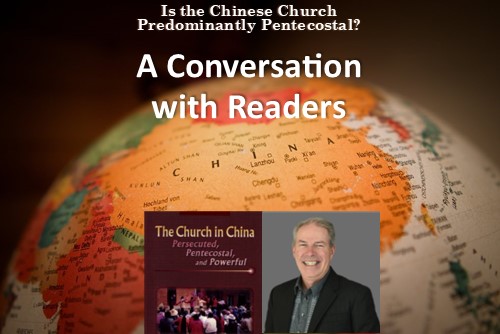Robert Menzies: Is the Chinese Church Predominantly Pentecostal? Conversation with readers
The editors of PneumaReview.com are always glad to hear from our readers. We want to encourage interactions with our writers whenever possible. Thank you for leaving comments and sharing with others what has made you think, what’s encouraged you, or even what you disagree with.

Is the Church in China Predominantly Pentecostal?
PneumaReview.com reader ISC wrote:
Actually, I don’t think the True Jesus Church [discussed in “Is the Chinese Church Predominantly Pentecostal? Part 3: Gaining Perspective“] was directly influenced by Pentecostal Truths (Wuxunjie zhenlibao). I had a chit-chat with Prof. Bays during the break time at a symposium in 2013, I asked him how he made the conclusion that Pentecostal Truths influenced the TJC? This periodical reflects a quite strong Holiness Pentecostal perspective while the TJC has its root in Oneness Pentecostal missionary Berntsen. He said to me that leaders from the TJC told him this way when he visited its general assembly in Taichung, Taiwan many years ago.
According to what I have known, many TJC folks do not know that Classical Pentecostals can be divided into Holiness, Finished work, and Oneness. Most of them think all the Pentecostals believe in salvation and Spirit-Baptism identical experiences as what Oneness Pentecostals do. To put it simply, most of them do not know that Pentecostals mostly believe in “subsequence” except Oneness Pentecostals. So, it’s not necessary for them to look into what type of Pentecostal sub-traditions the Pentecostal Truths actually carried.
According to some more overall field investigations, churches in China including those with Pentecostal characteristics mostly feel uncomfortable with being called “Pentecostal” or “Charismatic”. I think one should be cautious of using a Western-made term such as Pentecostal or Charismatic to describe Christianity in the global south.
Furthermore, leaders from the five largest house church groups in China such as Zhang Yinan tend to avoid identifying themselves as Pentecostal or Charismatic. Rather, they would like to learn from various Christian traditions.
Robert Menzies responded:
First, let me say that I appreciate the reader’s interesting comments and informed suggestion with respect to the origins of the TJC. Nevertheless, I still have to side with Daniel Bays on this one.
Although the TJC was a oneness Pentecostal group, this does not preclude its early leaders from being influenced by the Pentecostal Truths (Wuxunjie zhenlibao) as Bays argues. One can see how both the Pentecostal Truths and Berntsen both exerted influence. Pentecostals tended to feature Acts, so a oneness perspective flowed from this literalistic (and I would add, in the case of oneness Pentecostals, myopic) perspective.
Most Pentecostals today do not live in the global West.
In response to the reader’s comments about attitudes toward the terms, “charismatic” or “Pentecostal,” in China, I offer the following. While it is true that the term “charismatic” (lingen) often has pejorative connotations in China, the term “Pentecostal” (wunxunjie) is generally viewed favorably. Some groups are quite willing to accept this label. Leaders of the Fangcheng group, for example, emphasize their Pentecostal beliefs. Other groups that are not “classical” Pentecostal but accept most of the features of Pentecostal theology and praxis, may be more cautious in using the label. I suspect that the language they use often depends on the context and with whom they are speaking.
Have you posed this question to Dennis Balcombe? I believe Dennis has had more first-hand experience with these groups than any person I know. I’m confident that Dennis would affirm my conclusion, based on my own experience with leaders from various house church groups (as well as a written survey – see my ”Pentecostals in China,” in Vinson Synan and Amos Yong, eds., Global Renewal Christianity: Spirit-Empowered Movements Past, Present, and Future, vol. I: Asia and Oceania [Lake Mary, Fla.: Charisma House Publishers, 2015], 67-90).
I would add that to suggest that the term, “Pentecostal,” is Western, is simply wrong. Most Pentecostals today do not live in the global West. Furthermore, the term is biblical and flows from the Bible. While I hope we all want to learn from the various Christian traditions, this should not blind us to the Pentecostal character of much of the Chinese house church movement. Perhaps the more important question is, how do we define the term, “Pentecostal”? I have been careful to clearly define this term in my writings and I do believe that the term must be understood theologically, not simply phenomenologically.
Robert Menzies
Category: Church History, Summer 2023


